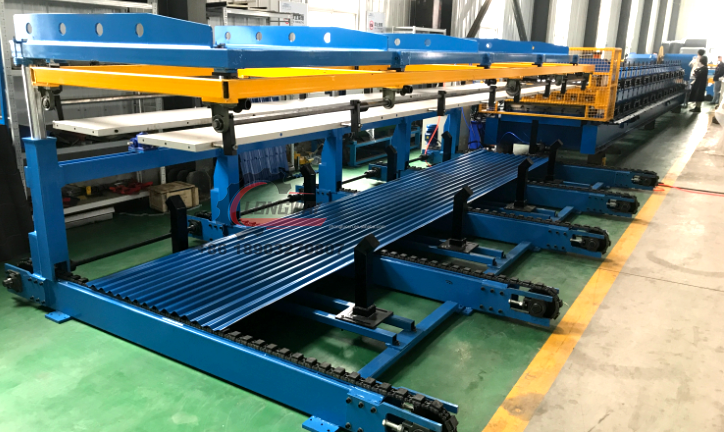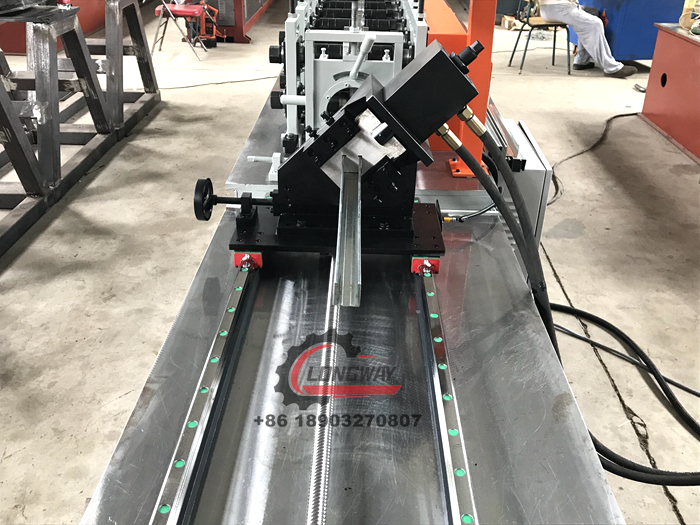High-Quality Metal Roof Machine Reliable Roll Forming Manufacturers & Factories
- Introduction to Metal Roof Machine: Market Demand & Industry Evolution
- Technological Advancements: What Sets Modern Roll Forming Machines Apart
- Comparative Analysis: Manufacturers, Factories, and Sale Companies (with Data Table)
- Customization Options for Specific Industrial Requirements
- Industry Application Case Studies and Performance Metrics
- Factors Affecting ROI and Long-Term Benefits for Investors
- Conclusion: Selecting the Right Metal Roof Machine Partner

(metal roof machine)
Introduction to Metal Roof Machine: Market Demand & Industry Evolution
The metal roof machine
industry has seen robust growth in recent years, driven by increasing demand for durable, energy-efficient roofing solutions in commercial, industrial, and residential construction. According to the Global Market Insights report, the metal roofing market exceeded USD 17 billion in 2022 and is projected to grow at a CAGR of 4.2% up to 2032. This surge is attributed to the proliferation of metal roof installation in green building projects and severe weather-prone regions. Roofing contractors, developers, and manufacturers alike are recognizing the long-term benefits of precision-engineered roof panels, leading to surging investments in automated roll forming technology and a steady expansion in the global supplier base.
The modern metal roof roll forming machine has become the backbone of quality and efficiency. Across synergistic networks of metal roof roll forming machine for sale companies, factories, and manufacturers, businesses are realizing unprecedented productivity gains. In a landscape shaped by digital transformation, machines now deliver rapid changeover times, exact panel dimensions, and minimized waste, leading to optimized TCO (total cost of ownership) for stakeholders at every level of the value chain.
Technological Advancements: What Sets Modern Roll Forming Machines Apart
Leading-edge metal roof roll forming machinery offers an array of features that propel it far beyond previous generations. Innovative servo drive systems and fully automated control panels now enable seamless operation and error mitigation, reducing labor costs and production stoppages. Integration with IIoT (Industrial Internet of Things) ensures real-time monitoring: operators can access live data analytics on everything from material feed rates and cutting precision, to panel profile quality.
Advanced machines accommodate high-strength steel, aluminum, copper, and specialized coated metals, supporting panel thickness ranges from 0.2mm to 1.2mm at speeds exceeding 25 meters per minute. Tool-free profile switching and modular line configurations mean that businesses can flexibly respond to fast-changing project needs. In recent studies, adopters of next-generation automation have reported scrap reduction of 30% and average productivity improvements equivalent to 2-3 additional output shifts per month.
Comparative Analysis: Manufacturers, Factories, and Sale Companies
Selecting the right partner for metal roof roll forming technology hinges on a multitude of factors: manufacturing capability, technical support, equipment warranty, customization, and post-sale service. While metal roof roll forming machine for sale companies frequently serve as bridge solutions—offering a range of new and certified pre-owned models—dedicated factories and manufacturers have complete control over R&D, build quality, and integration.
Below is a comparative table highlighting key differentiators among top global providers:
| Provider Type | Annual Output (Units) | Lead Time (Days) | Customization Level | Warranty (Years) | Technical Support | Global Reach |
| Leading Manufacturer A | 800+ | 45 | Full; OEM/ODM | 2 | 24/7 Online, Onsite | 70+ Countries |
| Top Factory B | 650 | 40 | Custom Profiles | 1.5 | Business Hours | 40+ Countries |
| Sale Company C | — | 15 (Stocked) | Limited | 1 | Remote | 30+ Countries |
| Factory-Integrated Group D | 1000+ | 50 | Turnkey Projects | 2.5 | Dedicated Account Managers | 90+ Countries |
As evidenced, the manufacturers and vertically integrated groups typically offer extended warranties, deeper technical customization, and broader on-demand support. However, sale companies can provide rapid turnaround for standardized models, suiting those needing immediate deployment.
Customization Options for Specific Industrial Requirements
One of the most critical differentiators in the purchase decision is the ability to tailor a metal roof roll forming line to the precise needs of the client’s facilities, logistics, and end-product specifications. Modern factories provide expansive modularity: optional decoilers (3T, 5T, 10T), hydraulic cutting mechanisms, embossing stations, and fully integrated slitting systems. Panel width adjustments between 400mm and 1250mm and programmable punching for skylights, gutters, and fastener locations are increasingly standard.
To address low-noise manufacturing environments, noise-reducing housings and precision roller bearings have become essential. Bespoke software interfaces deliver customized recipe management, user-level permission control, and production scheduling for just-in-time workflows. For commercial clients, integration with enterprise resource planning (ERP) systems is now a competitive must-have. In heavy-duty sectors, higher grade steel frame bases and reinforced drive trains ensure stability under 24/7 operation loads while maintaining panel accuracy within ±0.10mm.
Industry Application Case Studies and Performance Metrics
Real-world deployments of advanced metal roof machines have catalyzed operational breakthroughs. For instance, a European building systems firm expanded annual steel roofing panel output by 28% with a new automated line, while reducing operator labor by 41%. In North America, a large logistics warehouse contractor reported cutting installation costs by 34% and achieving panel wastage rates below 2%, a benchmark unattainable with legacy systems.
Across the solar-integrated roofing market, dedicated roll forming lines equipped with automated punching modules enable a 60% acceleration in profile fabrication, supporting rapid PV assembly. Industrial audits in 2023 showed that firms adopting high-efficiency machines achieved average payback periods of 27 months, compared to over 45 months for conventional hydraulic systems. The performance metrics consistently underscore that technology, not merely capacity, is pivotal for scalable growth and downstream profitability.
Factors Affecting ROI and Long-Term Benefits for Investors
Selecting the right metal roof roll forming machine impacts not only initial capital outlay but also long-term maintenance, production flexibility, and resale value. Major cost-saving factors include integrated safety systems reducing workplace incidents (average reduction of 26%), robust after-sales service contracts, and platform upgrades compatible with evolving panel geometries or market compliance regulations. Machines featuring predictive maintenance modules have proven to limit unscheduled downtime by up to 45% over five years.
Investors are increasingly prioritizing technology partners who publish transparent TCO models and facilitate process audits before purchase. By opting for partners with a proven global supply chain, companies mitigate risks associated with component shortages and logistics disruptions. Long-term equipment financing options, performance-based service agreements, and dedicated training programs further augment the investment case for advanced roll forming systems designed for modern metal roofing applications.
Conclusion: Selecting the Right Metal Roof Machine Partner
Choosing a metal roof machine supplier demands a holistic evaluation—balancing upfront cost, technical innovation, post-sale support, and capacity for future scaling. With an array of options spanning metal roof roll forming machine for sale companies, factories, and manufacturers, professionals must weigh not only product feature sets but also factors such as lead time reliability, depth of customization, and global service infrastructure. The data consistently support the business case for advanced automation: faster ROI, operational resilience, and geometric product consistency.
As market competitiveness intensifies, aligning with a capable manufacturer or integrated factory partner can unlock sustained success—whether for new facility launches, ongoing project demands, or strategic expansion into energy-efficient building segments. Ultimately, the optimal metal roof machine investment is realized through informed comparison, site-specific customization, and a commitment to technical support that extends far beyond machine commissioning.

(metal roof machine)
FAQS on metal roof machine
Q: What is a metal roof machine?
A: A metal roof machine, also known as a roll forming machine, forms metal sheets into roofing panels. It's widely used for producing consistent, high-quality metal roofing. These machines are essential in modern construction.Q: How can I find reliable metal roof roll forming machine companies for sale?
A: Look for companies with good reputations, certifications, and customer reviews. Compare prices, after-sales service, and warranty terms before making a purchase. Many reputable suppliers list their machines on industry websites.Q: What should I consider when choosing metal roof roll forming machine manufacturers?
A: Consider the manufacturer's experience, customization options, and technical support. Check product quality and global service capabilities. It's wise to request client references or case studies.Q: Do metal roof roll forming machine factories provide installation and training?
A: Many factories offer installation and technical training services. Training ensures correct machine operation and maintenance. Always confirm the extent of these services before purchasing.Q: Are there different types of metal roof roll forming machines for sale?
A: Yes, options vary based on panel profile, material thickness, and automation level. Manufacturers and factories often provide custom solutions. Discuss your specific requirements with suppliers to get the best fit.-
Corrugated iron roofing sheet making machine with CE, AutoNewsNov.17, 2025
-
3mm Steel C U Channel Roll Forming Machine, Heavy DutyNewsNov.17, 2025
-
Calamima Micro Ondulada corrugated roof sheet machine - CNCNewsNov.17, 2025
-
Metal Roofing Roll Former for Sale Companies - Fast, PreciseNewsNov.17, 2025
-
Drywall Steel L Angle Bar forming machine | Fast, PreciseNewsNov.17, 2025
-
Corrugated Iron Roofing Sheet Making Machine, Fast & DurableNewsNov.11, 2025
-
Corrugated Metal Roofing Machine | High-Speed, Precise, CENewsNov.11, 2025







